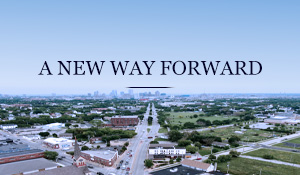I vividly remember the moment I realized the pandemic would drastically change our community.
A Near West Side restauranteur informed me that he had to let go of 85% of his staff. Before I knew it, businesses left and right, not only in the Near West Side but across our city and country, were similarly forced to downsize staff and cut back, if not completely halt, operations.

A New Way Forward
This is the third in a series of “Community Voices” that invites our neighbors to share what they’ve learned during the pandemic and their visions for a better Milwaukee.
This business owner, like many in the Near West Side, adapted. Curbside service and app-based food delivery services helped restaurants, and the use of physical signage and social media to communicate with customers helped sales slowly but surely come back after the initial closures. By thinking on their feet, beloved restaurants like Five O’Clock Steakhouse, Daddy’s Soul Food and Triciclo Peru were able to continue serving their customers and avoid shuttering their doors.
Our communities, like many others, suffered financially, emotionally and mentally. The stress of ongoing challenges impacting many families in our area like poverty, systemic racism and food insecurity, on top of adjusting to life in a pandemic, was overwhelming.
Many of our Black and brown communities in the Near West Side faced higher rates of unemployment, sickness and even death. While experiencing the tragic loss of loved ones and loss of income, many community members also struggled to pay for and access basic necessities.
Near West Side Partners teamed up with Harley-Davidson, Molson Coors and Advocate Aurora Health, three of our five anchor institutions, to collect and distribute donations for Near West Side seniors, public housing residents and families. In pulling together resources, we were able to provide everyday products like soap, detergent, fresh produce and, yes, even toilet paper, to our neighbors in need.
Near West Side retailers responded to resident needs by expanding their household goods and produce offerings. Mandeep, the owner of local gas station Hometown, listened to residents and put together a small produce section selling potatoes, onions, bananas and milk. Bobby Singh, owner of Kilbourn Supermarket, similarly upgraded his frozen food section to sell more staples like meat, fish and fresh vegetables.
Working alongside Associated Bank and a few other funders, we were able to support those who both lived and worked in the Near West Side by providing 40 families in need with rent vouchers.
When people needed support, they could depend on their neighbors and community leaders to lend their kindness and serve with giving hearts. Everyone in the Near West Side stepped up and played a role in holding the community up through the most difficult moments.
The pandemic brought to light the neglect of many of our institutions citywide. Schools, families and houses of worship had clearly been struggling for years and were in need of support more than ever. This discovery led us to begin brainstorming new and better ways to boost these institutions and address the needs of our residents. We opened up space to have important conversations about wages and the cost of housing, transportation and education.
Putting a higher priority on mental health is another key takeaway from the pandemic. Near West Side Partners hopes to ensure that community members have greater access to the resources they need and put more emphasis on connecting as a community.
Long after the pandemic is over, the strong social bonds and community infrastructure cultivated during this difficult year will stay with our community. Block watches, block parties and community gatherings will all serve as important tools to maintain this closeness.
Lastly, we must work to support a living wage in our community. Giving employers, employees and individuals seeking work the tools they need to live well and meet their needs is a top priority. First responders and essential workers sacrificed a lot to ensure that Americans got the care and services they needed — it is only fair we do the same for them.
With widespread vaccine accessibility and reopening of the economy, things are looking up, but we still need each other. We cannot forget about the crucial role our neighbors, local businesses and the network of people who live around us played in forming support systems during the pandemic.
The past cannot be undone, but with the right vision, leadership and political capital, our city will get back on the right track. The talent, resources and desire are there; we’ve seen it is our very own community. We must seize this opportunity and lay the foundations for a better future for those who are here today and for those who follow us tomorrow.
Keith Stanley is the executive director of Near West Side Partners.
Editor’s note: Have something on your mind? “Community Voices” is the place to let Milwaukee hear what you have to say. To be considered, we need your name, email address and phone number for verification. Please email your submissions to info@milwaukeenns.org.
In case you missed it
OPINION: When it comes to our education system, it’s time to let young people lead the way



